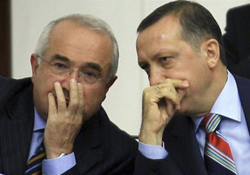
 Although it seems Turkey has blunted its extreme position against Syria, the reality is far from being so. Turkey has had a tactical retreat, waiting for opportunity conducive to their objectives.
Although it seems Turkey has blunted its extreme position against Syria, the reality is far from being so. Turkey has had a tactical retreat, waiting for opportunity conducive to their objectives.
Turkey has changed the rhetoric against Syria. A witness to this is Turkey’s acceptation that Syrian crisis is solved including Assad.
Furthermore, plan proposed by Recep Tayyip Erdoğan, that includes Iran and Russia in negotiations is an indication of change in Turks’ position. Turkish officials had previously criticized Iranian and Russian role in the Syrian crisis, and even excluded these two countries from Syrian crisis talk process.
The change in Turkish position has detected by international analysts and observers as having different reasons, including the given reasons by Turkish media for security, economy and politics. For example, Turkish media had it the Central Bank of the Turkey has predicted economic recession symptoms.
Politically, Justice and Development Party has faced increasing criticism by the opposition.
A poll indicated that Turkish people believed that Turkey should remain neutral and should not support any party in Syria. So, analysts point to Turkish complicated position on Syria, saying that Erdoğan government has not been strong enough for convergence of its allies to its approach and to influence the developments in Syria. Thus, the benefits of a zero-sum approach in dealing with neighbors have surfaced.
Perhaps, the change would help Turkey, but it is not all the issue. US, UK, France, and Turkey, along with reactionary Arab governments in the region, have embarked on extensive propaganda on media, human rights, security and virtual networks issues.
They had invested in the primary pressures mounted in Daraa, which might imbue all Syria and bring its disintegration. The plan failed in Jordan-Syria borders, and they immediately implemented the alternative plan in Baniyas in Lebanese borders, which had the same fate as that in Daraa.
A third phase of the plan was to be implemented in Jisr al-Shughour. According to plans by Israel, US, and Turkey, Kurd, Turk, and Salafist forces affiliated with Ikhwan (Muslim Brotherhood) implemented the third phase. They expected a swarm of refugees from north of Syria to Turkey. But that was also aborted by Syrian Army, and their attempts to form a buffer zone in north of Syria and bring it under international spotlight was failed.
With the plan for destabilizing Jisr al-Shughour failed, short-lived unrests in Noman and north eastern parts in Iraqi borders, which fell short of the capacity necessary for creating insecurity. It seems that the uncontrollable nature of armed rebels in Syria has confounded the failure, and has brought the West to a state of hesitation in providing support for Turkey’s mercenaries in Syria.
Turkeys, on the other hand, are concerned with Al-Qaida presence in their southern borders, since it can act as double-edged sword, whom the West and Turkey deemed controllable and used for their objectives, but now they have come to the idea that Al-Qaida is out of control, posing trouble for Turkey and West, especially with the threat posed by extremism to Turkey.
All these events, in sum, has blunted Turkey’s harsh stance about Syria. On the other hand, since Ankara has not had an independent policy, being in line with policies dictated by forces beyond the region, Turkey seems to change its position on Syria according to US foreign policy shift. This will be definitely a short-lived tactical shift, and it could not be seen as long-term.
To see more on the issue, time, and of course, outcome of John Kerry’s regional visits would bring more in near future.







